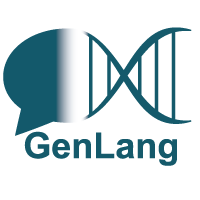 | GenLang Consortium |
GenLang
GenLang is an international network that facilitates large-scale genomic investigations in relation to speech, language, reading, and related skills. The consortium brings together leading scientists from around the world who are interested in the genetic underpinnings of traits related to spoken and written language, not only for disorders but also interindividual variation in the normal range. As for most other human traits, the relevant genetic architecture is complex, heterogeneous, and multifactorial. Faced with such complexity, other fields of human genetics have greatly benefited from co-ordinating activities, and creating synergies between like-minded research teams, which has yielded important advances. With GenLang, the language sciences are also taking advantage of this successful team-science research model. GenLang operates under a set of agreed organizing principles that enables researchers to complement their ongoing research programmes with collaborative opportunities that might not otherwise be possible, in as transparent and inclusive a way as possible.
The primary goals of GenLang are (a) to develop and foster a network of actively-engaged researchers who are interested in sharing ideas and expertise in relation to genetic contributions to language and related traits; (b) to provide a flexible framework for robust high-powered genome-wide investigations of speech, language, reading, and related skills via meta-analyses of existing datasets; and (c) to find ways of harmonising approaches to phenotype definition across different collections, and help establish standardized testing approaches for future work in this area, across multiple languages. Phenotypes of interest to the network include disorders such as childhood apraxia of speech, developmental language disorder, and dyslexia, as well as quantitative measures of speech-, language-, and reading-related skills spanning the entire range of abilities.
Examples of GenLang activities include a genome-wide association study of quantitatively assessed reading- and language-related skills in up to ~34,000 participants, and establishment of a working group on developing online language assessment batteries for genomic studies.
Contact
If you would like to find out more about GenLang or learn about ways to participate in the network, please contact Simon Fisher.